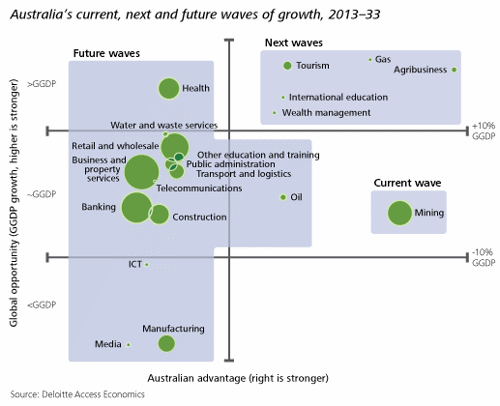
Building the Lucky Country Part Two
Grant Cameron | 17 December 2013
Catching the next wave
Seeds of growth
Deloitte recently released the latest in its highly regarded “Building the Lucky Country” series. Following the two prior pieces, Where is your next worker? (November 2011) and Digital Disruption – Short fuse, big bang! (November 2012), this paper, Building the Lucky Country #3: Positioning for Prosperity, asked the question - with a cooling resources boom, a new government, rebounding business confidence and a falling Australian dollar - what’s next for Australia?
In the last Motor Industry Alert we explored how businesses might go about getting ready to take advantage of the opportunities that are coming for Australian businesses. In this MIA we will look specifically at how Australia’s car makers and dealers might benefit from the prosperity these opportunities may bring.
The seeds of growth for the next two decades in Australia are likely to be found in our unique advantages in agribusiness, gas, tourism, international education and wealth management.

Together these five waves could be every bit as big as mining – in fact they could add a quarter of a trillion dollars to national income over the next two decades.
Agribusiness
The world’s population is expected to grow by 60 million people a year for the next 20 years. The growth over that period is equivalent to the size of India today. Asia is growing and on the move, with the process of urbanisation turning high yield farms into factories and houses. While many major producers face long term water shortages, Australia has plenty of land and is gaining from technological advances that allow increased yields from poor soils. Australia is, therefore, poised to take advantage of the supply gap in Asia and feed this growing part of the world.
Gas
Countries will turn to gas as they seek out ways to improve air quality and reduce greenhouse gases. Australia is well positioned to take advantage of this with vast gas reserves and infrastructure currently under construction to be ready by 2017.
Tourism
The growing world population will seek space, nature, holidays and luxury experiences. Australia is well placed to cater for these tourists due to our proximity to Asia, our beautiful natural assets, politically safe environment, language and cheap flights into Australia.
International education
More and more international students are seeking to study in an English speaking country. This is particularly true in China and India where our proximity gives us a leading edge over the elite institutions of the USA and UK nations.
Wealth management
Once again our close proximity to Asia (and its 2 trillion dollars in financial markets) and our sophisticated finance sector will enable Australia to grow to be a significant financial centre.
Car dealers will benefit
Car brands and dealers will benefit indirectly from these five fronts and, in particular, areas where the local or micro economics are influenced by the five super-growth industries including:
- Non-metro areas: sales of farming equipment and large vehicle pick-ups
- Tourism: rental cars and/or leisure vehicles
- Areas with natural resources will trade off the back of the increased economic activity in extraction.
Further to this, we see the AUD settling at US $0.80 in the longer term. This signals the starters’ gun on new opportunities for ‘dollar-dependent’ sectors such as manufacturing. It will also be a tail wind for interest rate sensitive sectors such as retail and housing construction. All that is missing is for Australian businesses and families to realise that our opportunities are just as great as they were at the start of the mining boom, but that they will come from different directions. With Deloitte’s quarterly CFO survey recently indicated that CFO confidence for the September quarter is at a high, it would seem the market is heading in the right direction!
The motor industry needs to be ready
Just as with the opportunities and dangers highlighted in Digital Disruption – Short fuse, big bang! and the benefits outlined in Where is your next worker?, the motor industry must increase their capacity to act to take advantage of the five super-industries.
Retail motor dealers should consider:
- Current dealership site footprint – opportunities to grow, consolidating sites and having an agile/adaptive footprint
- Digital opportunities – be on the lookout for opportunities and threats associated with the digital revolution
- People and capabilities – talent development & acquisition. To take advantage of the coming opportunities, your workforce must be prepared and agile. You need to be ready to serve and act in accordance with customers’ shopping and buying habits
- Financial readiness – is your Balance Sheet agile enough?
Getting the full picture
This has been an extract from Building the lucky country #3: Positioning for Prosperity. For more information on catching the next wave of prosperity in Australia please visit the Deloitte Australia website, or for your copy of the full version of the paper, please register here.
Alternatively, do not hesitate to contact one of the Deloitte Motor Industry Services partners listed below.
General Information Only
This presentation contains general information only, and none of Deloitte Touche Tohmatsu Limited, its member firms, or their related entities (collectively the “Deloitte Network”) is, by means of this presentation , rendering professional advice or services.
Before making any decision or taking any action that may affect your finances or your business, you should consult a qualified professional adviser. No entity in the Deloitte Network shall be responsible for any loss whatsoever sustained by any person who relies on this presentation.
About Deloitte
Deloitte refers to one or more of Deloitte Touche Tohmatsu Limited (“DTTL”), its global network of member firms, and their related entities (collectively, the “Deloitte organization”). DTTL (also referred to as “Deloitte Global”) and each of its member firms and related entities are legally separate and independent entities, which cannot obligate or bind each other in respect of third parties. DTTL and each DTTL member firm and related entity is liable only for its own acts and omissions, and not those of each other. DTTL does not provide services to clients. Please see www.deloitte.com/about to learn more.
Deloitte Asia Pacific Limited is a company limited by guarantee and a member firm of DTTL. Members of Deloitte Asia Pacific Limited and their related entities, each of which are separate and independent legal entities, provide services from more than 100 cities across the region, including Auckland, Bangkok, Beijing, Hanoi, Hong Kong, Jakarta, Kuala Lumpur, Manila, Melbourne, Osaka, Seoul, Shanghai, Singapore, Sydney, Taipei and Tokyo.
This communication contains general information only, and none of Deloitte Touche Tohmatsu Limited (“DTTL”), its global network of member firms or their related entities (collectively, the “Deloitte organization”) is, by means of this communication, rendering professional advice or services. Before making any decision or taking any action that may affect your finances or your business, you should consult a qualified professional adviser.
No representations, warranties or undertakings (express or implied) are given as to the accuracy or completeness of the information in this communication, and none of DTTL, its member firms, related entities, employees or agents shall be liable or responsible for any loss or damage whatsoever arising directly or indirectly in connection with any person relying on this communication. DTTL and each of its member firms, and their related entities, are legally separate and independent entities.

